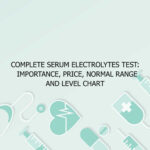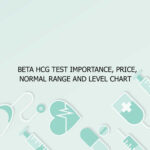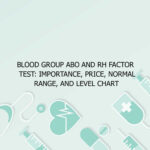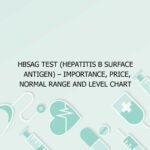Now Reading: Blood Group ABO and Rh Factor Test: Importance, Price, Normal Range, and Level Chart
- 01
Blood Group ABO and Rh Factor Test: Importance, Price, Normal Range, and Level Chart
Blood Group ABO and Rh Factor Test: Importance, Price, Normal Range, and Level Chart
The Blood Group ABO and Rh Factor Test is one of the most fundamental and universally recognized laboratory tests, playing a critical role in medicine, surgery, pregnancy management, and emergency care. This test determines an individual’s blood group according to the ABO classification system and identifies the presence or absence of the Rh (Rhesus) antigen, most commonly the RhD antigen, which is crucial for blood transfusions and prenatal health.
The ABO blood grouping system classifies blood into four main types: A, B, AB, and O. This classification is based on the presence or absence of specific antigens (A and B) on the surface of red blood cells. The Rh factor is a separate antigen that further categorizes blood groups as either positive (Rh-positive) or negative (Rh-negative). For example, a person may have a blood type such as A+, O-, B+, or AB-.
Knowing your blood group and Rh status is essential for safe blood transfusions, organ transplants, and pregnancy care. An incompatible blood transfusion can cause life-threatening immune reactions, while Rh incompatibility between a pregnant woman and her baby can lead to hemolytic disease of the newborn. This is why the Blood Group ABO and Rh Factor Test is part of routine medical checkups, pre-surgical evaluations, prenatal screening, and emergency diagnostics.
Importance of the Blood Group ABO and Rh Factor Test
The test is important for multiple reasons, spanning preventive, diagnostic, and life-saving medical applications:
- Safe Blood Transfusions – Blood transfusion compatibility depends on matching both the ABO type and Rh factor. Giving the wrong blood type can cause the immune system to attack transfused red blood cells, leading to severe transfusion reactions.
- Organ and Tissue Transplants – Blood group matching is an important step in organ and bone marrow transplantation to reduce the risk of rejection.
- Pregnancy Care and Rh Incompatibility Prevention – Rh incompatibility occurs when an Rh-negative mother is carrying an Rh-positive fetus, potentially leading to complications. Early detection allows preventive treatment with anti-D immunoglobulin.
- Emergency Preparedness – Knowing your blood type ensures quicker access to compatible blood in emergencies such as accidents, surgeries, or severe bleeding.
- Population Health and Blood Donation Programs – Helps blood banks maintain a balanced supply of all blood types, especially rare groups like AB- or O-.
- Forensic and Paternity Investigations – Blood typing can contribute to forensic identification and help exclude paternity in certain legal cases.
Normal Range and Level Chart for Blood Group ABO and Rh Factor
Unlike other laboratory tests, there is no “numeric” normal range for blood groups. Instead, the result is a categorical classification:
| Blood Group | ABO Antigen Present on RBCs | Antibodies in Plasma | Rh Factor | Compatibility Notes |
|---|---|---|---|---|
| A+ | A | Anti-B | Positive | Can receive A+, A-, O+, O- |
| A- | A | Anti-B | Negative | Can receive A-, O- |
| B+ | B | Anti-A | Positive | Can receive B+, B-, O+, O- |
| B- | B | Anti-A | Negative | Can receive B-, O- |
| AB+ | A and B | None | Positive | Universal recipient |
| AB- | A and B | None | Negative | Can receive AB-, A-, B-, O- |
| O+ | None | Anti-A, Anti-B | Positive | Can receive O+, O- |
| O- | None | Anti-A, Anti-B | Negative | Universal donor for all |
Price of Blood Group ABO and Rh Factor Test in India
In India, the Blood Group ABO and Rh Factor Test is relatively inexpensive due to its simplicity and widespread availability. In government hospitals and public health facilities, the test may be offered free of cost or at nominal charges. In private diagnostic centers and hospitals, the typical cost ranges from ₹150 to ₹500, depending on the location and facility standards. Premium hospitals or urgent testing services may charge between ₹500 and ₹800. Blood banks often provide blood grouping free of charge for donors, while pre-employment and pre-marriage screenings may include this test as part of a package.
10 Frequently Asked Questions (FAQs) About the Blood Group ABO and Rh Factor Test
What exactly does the Blood Group ABO and Rh Factor Test measure and why is it important?
The Blood Group ABO and Rh Factor Test determines two main aspects of your blood: your ABO blood group (A, B, AB, or O) and whether you have the Rh antigen (Rh-positive) or not (Rh-negative). The ABO classification is based on the presence of A or B antigens on red blood cells, while the Rh classification is based on the presence of the D antigen. This test is essential for safe blood transfusions, pregnancy care, emergency medicine, and organ transplantation. Incompatible blood transfusions can cause immune reactions that may be life-threatening, while Rh incompatibility during pregnancy can lead to hemolytic disease in the newborn. Knowing your blood type can also help in emergencies, ensuring quick access to compatible blood.
How is the Blood Group ABO and Rh Factor Test performed?
The test is quick, simple, and painless apart from a minor needle prick. A blood sample is collected from a vein, usually in the arm, and sent to the laboratory. The sample is mixed with reagents containing anti-A, anti-B, and anti-D antibodies. By observing whether agglutination (clumping) occurs, technicians can determine the presence or absence of specific antigens. Agglutination with anti-A means you have A antigen, with anti-B means B antigen, and with anti-D means Rh-positive. The results are typically available within minutes to a few hours, depending on the facility.
Why is Rh factor testing so important during pregnancy?
Rh factor testing is critical for pregnant women because Rh incompatibility can cause serious complications. If an Rh-negative mother carries an Rh-positive baby, the mother’s immune system may produce antibodies against the baby’s red blood cells. This can lead to hemolytic disease of the newborn (HDN), which causes anemia, jaundice, and in severe cases, stillbirth. Early detection allows doctors to administer anti-D immunoglobulin injections to prevent the mother’s immune system from attacking the baby’s red blood cells. This preventive treatment is usually given during pregnancy and shortly after delivery.
Can blood group change over a person’s lifetime?
Under normal circumstances, your blood group remains the same throughout your life because it is genetically determined. However, rare medical conditions like certain bone marrow transplants, stem cell transplants, or blood cancers can alter blood type. In these cases, the donor’s blood type may replace the recipient’s original type over time. Still, such changes are uncommon, and for most people, their blood group stays consistent from birth to death.
How does blood group compatibility affect organ transplants?
For organ transplants, ABO compatibility is vital to reduce the risk of rejection. A mismatch between donor and recipient blood groups can cause immediate immune reactions, leading to organ failure. While some transplants like liver transplants can occasionally be performed across ABO types in emergencies, kidney and heart transplants require strict blood type matching. Rh factor plays a smaller role in organ transplantation but is still considered in specific cases, particularly in bone marrow transplants.
Why is O-negative blood type called the “universal donor”?
O-negative blood lacks both A and B antigens as well as the Rh antigen, meaning it is the least likely to trigger immune reactions in recipients of any blood type. In emergencies when there is no time for blood typing, O-negative blood is often used because it can be safely transfused to almost anyone. However, O-negative is relatively rare, found in only about 7% of the population, so it is in high demand in blood banks.
What is the “universal recipient” blood type and why?
The universal recipient is AB-positive blood type. This is because individuals with AB-positive blood have both A and B antigens on their red blood cells and do not produce anti-A or anti-B antibodies in their plasma. Additionally, Rh-positive status means they can receive both Rh-positive and Rh-negative blood. This combination allows them to safely receive blood from all ABO and Rh types, making them universal recipients.
Is it possible to have rare blood groups outside ABO and Rh systems?
Yes, there are many other blood group systems, such as Kell, Duffy, Kidd, and MNS. While ABO and Rh are the most clinically significant for transfusions, rare antigen profiles can cause complications in certain cases. People with rare blood types may have difficulty finding compatible donors, which is why specialized blood donor registries exist to help match them.
How often should you test your blood group?
In most cases, blood group testing is only needed once, since your blood type doesn’t change. However, it may be repeated for confirmation before surgeries, transfusions, or during pregnancy to ensure accuracy. Keeping a record of your blood type is advisable, and many people choose to note it in their medical ID or emergency contact card.
Can incorrect blood group testing happen?
While rare, incorrect results can occur due to technical errors, contaminated samples, or unusual antigen variants. This is why blood typing is often confirmed with a second test before transfusions or transplants. Hospitals follow strict quality control measures to prevent such errors.
10 Sample Medical Journal Titles with Authors
- Advancements in ABO Blood Group Typing Technologies – Dr. Ramesh Nair
- Rh Factor and Hemolytic Disease of the Newborn: A Review – Dr. Anita Menon
- Universal Donors and Recipients: Clinical Significance of O- and AB+ Blood Types – Dr. Vivek Kumar
- Prevalence of Rare Blood Groups in the Indian Population – Dr. Shalini Gupta
- Blood Group Matching in Organ Transplantation – Dr. Arjun Malhotra
- Impact of Blood Group Awareness on Emergency Medical Response – Dr. Priya Sethi
- Rh-Negative Pregnancy Management in Rural Healthcare Settings – Dr. Harish Bhatia
- ABO Blood Group and Cardiovascular Risk Correlation – Dr. Meera Joshi
- Blood Group Distribution Trends in South Asia – Dr. Aditya Rao
- Technological Innovations in Blood Group Serology – Dr. Kavita Sharma









